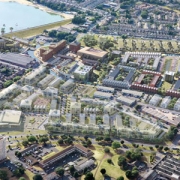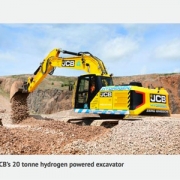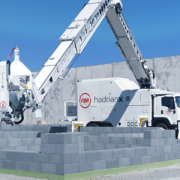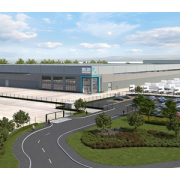Offsite Solutions, the UK’s leading bathroom pod manufacturer, has been awarded the first contract for its new enhanced and floorless GRP pods developed for the build-to-rent sector – a £1.6m project for ISG in Cardiff.
Offsite Solutions will manufacture over 400 bathroom and shower pods for Cardiff Interchange – an £89m flagship, mixed-use construction project for developer Rightacres Property. The scheme is designed by Holder Mathias Architects.
The bathrooms and shower rooms for 318 apartments for the private rental sector will be manufactured and fitted out offsite and installed on each floor as the building structure rises. This solution will reduce the build programme and the number of trades required on site and will enhance quality.
A UK industry first, Offsite Solutions’ new floorless GRP pods allow the bathrooms to be installed directly onto the floor slab to achieve continuous level floors throughout each apartment whilst minimising floor build up for each storey. This innovation in pod technology is ideal for build-to-rent schemes.
The enhanced GRP pods are also designed to have a strong aesthetic to appeal to prospective tenants. At Cardiff Interchange, the pods will have a tile-effect finish to the bath and shower areas, an inset feature wall with natural grey porcelain tiles and a recess above the bath with a coloured back panel.
Other design details for this project include a flush mirror-fronted cabinet which runs the full width of the bathrooms, wall-mounted toilet and hand basin, grey coloured vanity top, heated ladder towel rail, over-bath shower, and feature panels behind the toilet and basin finished in arctic grey. The shower and bath pods have shower trays and baths pre-installed and both have rain head and handheld showers.
Commenting on the specification of bathroom pods for this scheme, Jason Hyett, Director of developers Rightacres Property, said, “We needed little persuading of the advantages of applying offsite construction and a manufacturing process for the bathrooms on this development. The floorless option is an innovative solution to ensuring continuous level floors throughout the apartments. From our initial factory visit, we were impressed with the way Offsite Solutions approached the design process and their flexibility to accommodate our precise requirements at every stage. The first pods look great and we look forward to all the units being delivered to site later this year.”
Simon Pritchard, Senior Design Manager at ISG said, “Where there is a high degree of repetition in the bathroom layouts, pods are the ideal solution. The use of offsite construction reduces the number of fit-out trades on site and gives us the benefit of a much faster build programme. We have used Offsite Solutions’ pods on other projects and have found the quality of bathroom manufacture in a factory is consistently improved.”
James Stephens, Managing Director of Offsite Solutions, said, “We have had a lot of interest from build-to-rent developers in our new enhanced GRP bathroom pods. We have estimated that GRP pods can reduce maintenance costs by over 50 per cent compared to traditionally built bathrooms. The capital costs are around 15 to 20 per cent less than steel-framed bathroom pods. The figures make these new pods a very compelling proposition for developers in the private rental sector.”
All Offsite Solutions’ GRP bathroom pods have a panelised construction which is unique in the UK. This creates vertical walls and 90° corners to allow easier integration and the use of standard door sets to avoid further work on site. This design also improves aesthetics by avoiding tapered walls which you have with pods created from single GRP moulds.
Offsite Solutions offers the UK’s largest range of pods to suit many different building types and applications. Options include steel-framed bathroom pods with porcelain-tiled finishes for high-end apartments, PRS, student residences and hotels; robust and low maintenance GRP composite shower pods for student accommodation, build-to-rent, care homes, social housing and healthcare; hybrid pods for specialist projects, and award-winning demountable GRP pods for ease of installation in refurbishment schemes.
Offsite Solutions has also developed steel-framed utility pods for apartments or studios for build-to-rent or build-to-sell developments.












